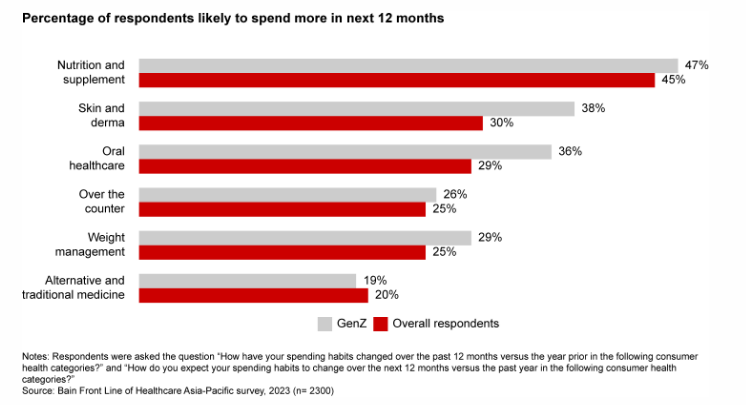 Photo via Envato
Photo via Envato
How can the healthcare sector overcome its digital adoption lag?
It had the second-lowest digital consumer adoption rate compared to other industries.
Patients may be eager to share their personal data with hospitals, but the healthcare sector is struggling to keep up due to its slow digital adoption.
According to McKinsey & Company, the sector was observed to have the second-lowest digital consumer adoption rate globally, lagging behind industries like entertainment, banking, and utilities.
This discrepancy is striking, given that 44% of global consumers were willing to share personal information with healthcare providers, a rate that ties with financial services and is more than double for technology and retail organisations.
“More than half of surveyed consumers expressed interest in using their personal data to manage chronic conditions, receive personalised health and well-being insights or receive personalised product and insurance recommendations,” McKinsey & Company said.
Willing spenders

In the Asia Pacific, 51% of consumers were willing to pay more in exchange for improved health outcomes, better experiences, and greater efficiency, according to a Bain & Company survey. Over half of these are Gen Z respondents, particularly interested in healthcare maintenance and lifestyle changes.
Moreover, consumer-driven health monitoring has surged in the region due to the emergence of affordable smart wearables, such as watches and bands.
Speaking to Healthcare Asia, Alex Bolton, a partner at Bain & Company, emphasised the importance of providing convenience, quality, and proactive management. He noted that consumers today expect timely services, like receiving medicine within two hours at home, and are dissatisfied with the traditional model of scheduling appointments and waiting to see a doctor.
This has led about 70% of end-users in China, India, and Indonesia to trust digital health and tech companies to manage their healthcare needs, though offline providers maintain a trust advantage of around 40% over digital solutions in Australia, Malaysia, Singapore, and the Philippines.
Transformative mindset
To meet evolving consumer needs, healthcare organisations are urged to adopt advanced technologies, such as remote monitoring, artificial intelligence (AI), and integrated electronic health records.
In APAC, China and Hong Kong hold high funding for AI-backed devices, whilst a number of Indian start-ups are focused on offering AI-driven health solutions, according to Bain & Company.
Meanwhile, a hospital in the Philippines has invested in developing an electronic medical records system, both to boost effective data management and to open new opportunities for tech innovation.
Yet, to fully realise the value of technology and data in healthcare, organisations are encouraged to employ a mindset that focuses on end-to-end transformation.
“This includes implementing transformation best practices, such as setting a clear road map enforced by an operating model that holds leaders accountable for change, hiring dedicated talent, and launching change management to promote adoption and scaling,” McKinsey said.
In essence, the industry must commit to a thorough and strategic overhaul of processes, leadership, and workforce to leverage technology and data effectively.
Questions to consider:
1. What strategies should healthcare organisations adopt for effective digital transformation to meet their consumers’ evolving needs?
2. What impact does the trust advantage of offline healthcare providers have on the adoption of digital health solutions in different regions?























 Advertise
Advertise







EXPERT OPINION
1. What strategies should healthcare organisations adopt for effective digital transformation to meet their consumers’ evolving needs?
The strategies will not differ too greatly from implementing innovation and transformation in other non-healthcare organisations, namely - people, mindset and company culture. In most instances, there should be some clear framework of reasonable risk-taking and what innovation, risk-taking, research, "doing things out of the norm" would mean for the organisation and the teams involved. At the same time, the standard metrics of ROI, outcomes and deliverables of such transformation and project initiatives may need some rethinking. For many organisations not used to rapid changes or the need of constant innovation in the delivery of their core business such as in insurance and healthcare, this may be a struggle even for the business leaders and industry leaders.
2. What impact does the trust advantage of offline healthcare providers have on the adoption of digital health solutions in different regions?
There may be more nuances to this issue - there is suggestion of homogeneity in trust issues within the named countries. If true, this is indeed interesting, it may imply there are systemic trust issues with the healthcare system of those countries in addition to other possible factors with specific providers, online-vs-offline access and standards of care. Details of the survey methodology and the sampled population of the survey may help to shed further insights on this "trust" aspect.
Despite the promise of AI to deliver the next-generation of intelligent healthcare, the ecosystem is currently confronted with the chasm of translating the value potential to value realisation (from 'hype' to reality).
To ensure successful translation of AI in healthcare and realisation of outcomes for patients, clinicians and the healthcare ecosystem, three key factors are hypothesised; Access, Capability and Trust (the 'ACT' framework). Specifically,
Access: enabling equitable and financially sustainable access to AI across the care continuum
Capability: ensuring the capability and capacity to deliver, adopt and sustain AI in healthcare settings
Trust: establishing confidence in using AI to deliver ethical, safe and intended outcomes
Achieving this will take proactive multi-stakeholder collaboration across the healthcare ecosystem.
This is explored in further detail in our upcoming KPMG | APACMed whitepaper on 'Realising the potential of AI in MedTech within Asia Pacific', due to be launched in September 2024.